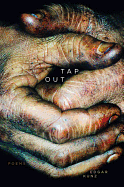
In a poem about waiting on line for food stamps, the narrator feels acute embarrassment, but then confides, "No one was looking. Nobody looks." Much of Tap Out by Edgar Kunz conveys this sentiment. Here is misery and desperation and no one is paying meaningful attention. And yet, Kunz later admits a cruel duality: "...drawing crowds of tourists/ who posed alone or with/ their blonde polo'd families a safe/ distance from their wilderness." The narrator feels both willfully ignored and scrutinized by rubberneckers. Readers are permitted to keep a safe distance from Kunz's "wilderness," a world of working-class poor, marred by suicide, death, drugs and violence. It is a world steeped in machismo or toxic masculinity. These poems have a pervasive physicality that is both rewarding and horrifying.
Kunz plays on these contrasts most effectively with the narrator's ambivalent relationship with his father, a dominating presence in the collection. In "Close": "He's still beautiful, my father. Fluid./ Powerful. His bare forearms corded/ with muscle, bristling in the cold. Yes,/ he's drunk." Yet, in "Natick," the speaker is scarred when his father "said I had piano hands,/ and I was ashamed, and hid them in the pockets of my coat."
Arresting imagery, unexpected detail, brilliant use of tensions, a flowing rhythm and overall accessibility make this a collection to be read and re-read. --Evan M. Anderson, collection development librarian, Kirkendall Public Library, Ankeny, Iowa

